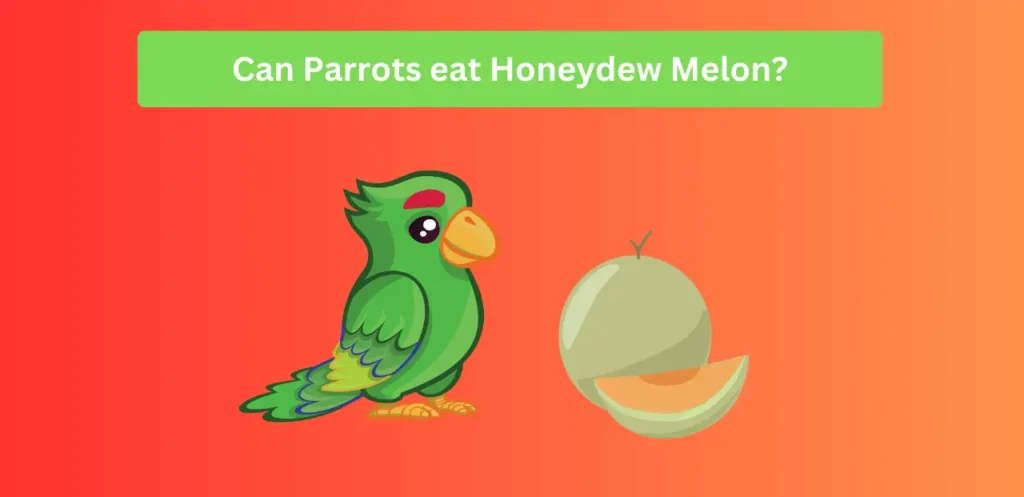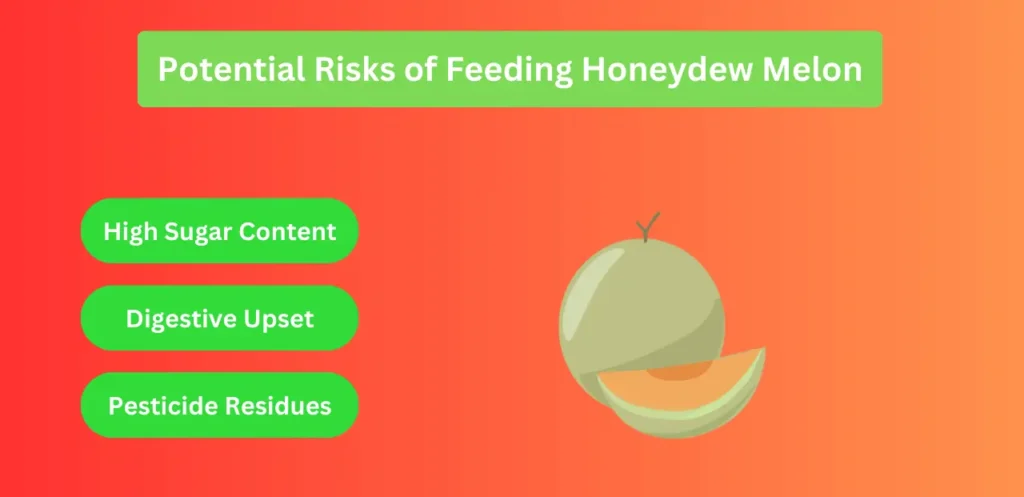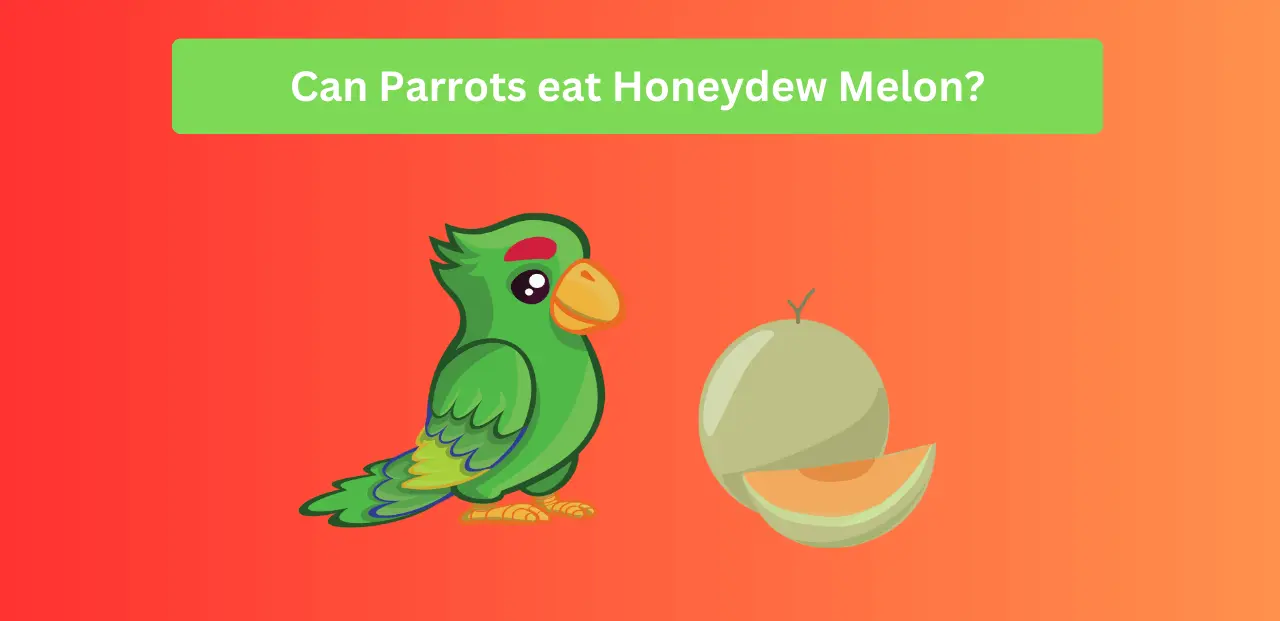Can parrots eat honeydew melon? Here’s what you have to know about incorporating this fruit into your parrot’s diet safely and beneficially. It is very good for this bird but contains no harm for it as people think, it gives water and Vitamin C for the bird’s immunity. However, care must be taken in the amount consumed from one type or the other, especially because the seeds of honeydew melon have to be disposed of and the fruit cut into smaller manageable portions.

Nutritional Value of Honeydew Melon
The other vitamins and minerals soluble in water that are found in honeydew melon include Vitamin C, Vitamin B1, potassium, and magnesium. It has a wealth of nutritional values besides having some drawbacks; it is thus in some cases a good treat to give birds provided they are in moderation.
- High in Vitamins: Honeydew melon contains minerals like vitamin C that act to bring up the immune system of the body.
- Minerals: This fruit also carries other minerals such as potassium and magnesium that assist in heart and muscle.
- Low-Calorie: Unlike other fruits honeydew melon is a low-calorie fruit and therefore is okay to indulge in sweets without the temptation to balloon up.
- Fiber: It is also characterised by a low dietary fibre content making it easy for digestion.
Benefits of Feeding Honeydew Melon to Parrots
- Hydration: Honeydew melon is ninety percent water and perfect for getting ur parrot water, particularly when the weather is hot.
- Immune Support: Some of these nutrients are used in the body to improve physical health and a high level of vitamin C which is found in the h Choose a category on the right to discover more about that specific category Health, Foods, and Nutrition Health.
- Digestive Health: The dietary fiber that is present helps in the digestion of food and each component is effective against constipation.
- Natural Sweetness: Honeydew contains natural sugars which are better for the health of the parrot than many processed products that are dangerous for the bird’s health.
Is Honeydew Melon Safe for Parrots?
Indeed they can take honeydew melon but in limited portions, and if it has to be in the form of seeds then it must be peeled. However, in its natural state, it is safe for the parrots and it is food should be fresh to them. However, there are a few important considerations:
Seed Removal: Do not feed your parrot honeydew with seeds to avoid blocking the throat or the presence of toxic compounds.
No Additives: Ensure that honeydew is served as natural and not frosted, with sugar syrup or preservatives that are unhealthy for the birds.
How to Prepare Honeydew Melon for Your Parrot?
To feed honeydew melon to your parrot, follow these steps:
- Choose a Ripe Melon: Choose a honeydew melon that has a slightly soft outer cover but should be hard enough on the inside. These fruits could also be too ripe which means are sweet for parrots.
- Wash Thoroughly: Wash the skin of the melon before peeling off and discarding it because it contains pesticide residues.
- Remove the Seeds: First, you have to cut the melon and remove all of the seeds.
- Cut into Small Pieces: Cut the melon into smaller pieces that your parrot will be able to deal with effortlessly.
- Serve Fresh: This one is rather simple, people should only feed their parrots fresh honeydew. Do not offer items that have stayed for long on the table since they are inappropriately close to the food.
How Much Honeydew Melon Can Parrots Eat?
Honey melon should also be fed to the parrot not in large quantities as it is very important when feeding it. Two or three items once or twice a week, not more than that. Fruits should be served sparingly because they are dense in carbohydrates vitamins and minerals, and interfere with the balanced ratio of seeds, pellets, and vegetables.
Potential Risks of Feeding Honeydew Melon

High Sugar Content: The sugars in honeydew are not added, but the consumption of it may cause such problems as obesity and other diseases in parrots.
Digestive Upset: So, probably, eating a lot of melon, everything at once, may result in diarrhea or loose stools.
Pesticide Residues: Non-organic melons may contain pesticide residues therefore advisable to wash or buy organic type of melons.
Signs Your Parrot Enjoys Honeydew Melon
Parrots show their approval of certain foods in various ways:
- Vocalization: A light call or shout of joy or surprise.
- Eager Eating: Taking it almost without delay and biting it very voraciously.
- Body Language: Dropping the wings or the head while feeding.
Conclusion
Honeydew melon is safe for your parrot and can be a delicious addition to the diet only if served appropriately. This tasty fruit replenishes water, vitamins, and fiber that would have been required from other foods in the body. So just be careful about how much and how often you extend these types of food to your feathered friend.
FAQs
Can animals eat honeydew melon?
Honeydew melon is safe for many animals, in moderation, primarily birds, rabbits, guinea pigs, and dogs. However, it should be taken without seeds and rind and should be taken in small quantities to avoid complications such as indigestion.
Can parrots eat honeydew melon seeds?
Honeydew melon seeds are unfit for parrots to eat although they take seeds of the honeydew melon plant. Although the internal part of honeydew melon is among some foods recommended for parrots in moderation, the seed is a swallowing concern and may upset the bird’s stomach. It is better if the seeds are removed from the fruit before offering it to your parrot.
Can parrots eat honeydew melon every day?
The honeydew melon should not be fed to parrots daily. Honeydew melon is not toxic to parrots but should only be given occasionally as it contains water and sugar which may cause stomach upset. Providing it once in a while is ideal, though other nuts, pellets, fresh vegetables, and other fruits will keep your parrot healthy and well-fed at the same time.
Related Posts

Abubakr is a passionate parrot enthusiast based in Pakistan. He shares his life with his vibrant parrot, Peto, and is dedicated to understanding parrot nutrition, behavior, and training. Through his experiences with Peto, Abubakr aims to gain a deeper insight into the needs and personalities of parrots and to share his knowledge with fellow parrot lovers. With a focus on the nutrition of conures, Abubakr is excited to connect with like-minded individuals and learn from their experiences.
